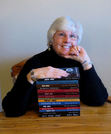Melissa Bowersock's Blog, page 3
July 29, 2019
Now Available: Dragon Walk on Audio
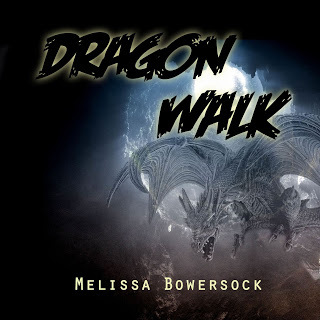 If you've been following the development of the Lacey Fitzpatrick and Sam Firecloud Mystery Series, you probably know that I've been converting the early stories into audio books even as I'm writing new stories. I've recently released Book 20, Prayer Walk, as both an ebook and a paperback, but meanwhile the conversion to audio books continues. I'm happy to announce that Dragon Walk, Book 5 of the series, is now available as an audio book.
If you've been following the development of the Lacey Fitzpatrick and Sam Firecloud Mystery Series, you probably know that I've been converting the early stories into audio books even as I'm writing new stories. I've recently released Book 20, Prayer Walk, as both an ebook and a paperback, but meanwhile the conversion to audio books continues. I'm happy to announce that Dragon Walk, Book 5 of the series, is now available as an audio book.Four months ago, a pretty young marathoner disappeared while training on the isolated trails of Griffith Park in Los Angeles. The police have few leads, no witnesses, and no results. As a last resort, they call in private investigator Lacey Fitzpatrick and Navajo medium Sam Firecloud to pick up the rapidly cooling trail. Sam and Lacey, however, are on the outs. Their efforts to take their relationship to the next level failed miserably, and now they must redefine their working relationship, as well. Can they find the murdered girl and her killer, and still hang on to their partnership?
You can see all my audio books here, as well as on Amazon. Additionally, you can sample each book for free.
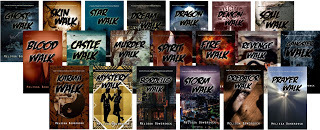
And remember, Book 1, Ghost Walk, is always only 99 cents for the ebook.
Published on July 29, 2019 09:24
July 3, 2019
What Makes a Great Character?With all the reading I do, I...
What Makes a Great Character? With all the reading I do, I’m very aware of how I feel about different characters in different books. There are times when I’ll go weeks — months, even — and not read a book that knocks me out. I begin to wonder if I’m getting jaded, but then, suddenly, a book comes along that I simply love and the characters are more like dear friends than two-dimensional sketches. These characters really grab me: make me laugh, make me cry, make me bite my nails with worry over their challenges. But they’re rare. Rarer than they should be. So it got me to thinking, what makes a really, really great character? Here’s my list, in no particular order.Intelligence. One thing that drives me crazy is a character who repeatedly does stupid things. I’m talking the twenty-something cheerleader-type who’s alone in an isolated cabin with a chainsaw murderer on the loose, and she goes outside with only a dinky flashlight to check on a weird noise. Really? That’s a special kind of stupid and she deserves everything she gets. No, I want my characters to be smart — smart but, for whatever reason, boxed into a corner, forced to make hard decisions, forced to really reach inside and find out what they’re made of.Rhett Butler is a smart guy. He understands economics, he understands war, and he’s good at keeping his head when everyone else is panicking. So he’s not so smart when it comes to falling in love, but we’ll get to flaws later on. Overall, he’s smart, he’s capable, and he’s effective. Quite the catch.Sympathetic. A good protagonist has a good heart. Okay, sometimes it’s buried under a ton of stuff: mistrust, betrayal, abuse, defense mechanisms. Sometimes the character has to assume a tough exterior, a hard-guy persona, in order to battle through his own demons, but underneath it all, he’s a good guy. Someone to root for. Someone to care for. We may only see glimmers of it from time to time, but it’s there. We know it.One of my books is a fantasy about a young peasant who gets pulled into the middle of the classic battle between good and evil. In the beginning, he takes on a purely personal quest, albeit an altruistic one, and that is to free his family from slavery. He’s very single-minded about this, and objects to being pulled into the larger conflict. On my first re-read, I realized he was too single-minded, and he showed a distinct lack of compassion for the people around him. He had nothing but petulant disdain for the hardships of others. I had to go back and write him softer, more empathic. Having him be more sympathetic to others gave him a deeper dimension, and also heightened the tension in his decision to press on with his own quest. It made him more human.Strengths. Our characters don’t have to be super-duper X-men to be interesting. Sometimes strengths come in very subtle packages: perseverance, support, encouragement, patience. Personally, I like willingness in a character. They may be up against a wall, their quest may be a longshot, but they are willing to go the distance.In one of my romances, the woman has been a doormat all her young life, but the threat of having her marriage fall apart spurs her to a newfound strength and conviction she never manifested before. It’s not courage in a grand, epic sort of way, but it’s still courage. Sometimes the subtle strengths can be the most profound.Weaknesses. All great characters have flaws. Secrets. Pasts that haunt them. The flaws make them human and provide tension — will he be able to do what he needs to do, or will the flaws be his undoing? Will his tragic past dictate his future? These weaknesses can take two tangents in stories; they can be things the character needs to overcome, or they can, surprisingly, become strengths, become the tools the character needs in order to accomplish his goal. Either way, they add a great deal of texture to the character and the story.Remember what I said about Rhett Butler? He’s smart, but he falls for Scarlet O’Hara, god knows why. He can handle himself confidently in business around town, on a profiteering ship and at a dance, but he can’t keep himself from wanting the stubborn and selfish woman who taunts him. This is the kind of flaw that must, eventually, be overcome. Sadly, regretfully, but yes, he must finally walk out the door. Not giving a …Motivation. What drives the character? What pushes him forward? This needs to be very clear. If a character has little or no motivation, it will be hard for us to believe he’s going to do what he says he’s going to do. I think I’ll go climb Mt. Everest. Why? I dunno; just seems like a good idea. Yeah, no.Growth. To my mind, this has to be at the end of the journey. What has the character learned, understood, accomplished, gained? With all the ups and downs our characters endure, all the hoops we put them through in their story, they have to end up different in some way. They have to be affected by what they’ve seen and done. If there’s no growth at the end of the story, I have to wonder if the character is just a blockhead after all.In one of my historical romances, the woman has led a very sheltered life as a pampered only child. When she travels to the wild west of Arizona to find the father she never knew, she’s faced with some very rough experiences, including time in an Apache village. While she’s repulsed at first by the primitive ways, she learns — reluctantly — that the Apache methods are exactly what are needed in the harsh landscape. It’s a lesson she thought never to learn — didn’t want to learn — but it stands her in good stead by the end of the book.Complexity. No human on earth is all good or all bad. I call this the Disney Syndrome. In Disney movies, we know who the good guy is, who the bad guy is, and neither will ever, ever, be anything else. This works for six-year-olds, but as adults we need more than that. We need complexity in our characters. We needs shades of gray (no, not that kind). This is where the flaws come in. Our guy is fighting a secret organization bent on controlling the world, but he’s also fighting his own fears, his own tendencies to give up and run and hide. The complexity of his character keeps us wondering which side will win out.Consistency. This can be a tough one. The character needs to stay in character throughout the book. If a guy has been a selfish S.O.B. all through the book and suddenly at the end he turns the other cheek and becomes Mr. Niceguy, are we going to buy that? He’s had no life-altering experience, no dark night of the soul, yet he just decides to be a good guy? I don’t think so. The characters have to stay true to their inner core, although obviously their experiences can lead them to do some heavy-duty soul-searching. I’m not saying they can’t change, only that if they do, there has to be a good reason for it.Physical Presence. Now that we have all these qualities, we need something to hang them on. We need just a pinch of physicality, something we can picture in our minds. I don’t need a full page of description down to the number of pores on the face, just a brief mention of the character’s defining qualities: ice-blue eyes, tall and lanky body, a shock of wild brown hair. I’ve read some books where I’ve gotten absolutely no indication at all what the character looked like, and while I could certainly conjure up something on my own, I noticed that I had a hard time imagining the dialog, the expressions, the carriage of the body. Just having a small bit of distinct description can move the character from words on a page to a visual, relatable image.These are the things I work to build into the characters I write, and the things I look for in the characters I read about. What about you? What do you look for in a memorable character? What are the make-or-break qualities that elevate a character from cartoon to real-life, three-dimensional hero?Originally published by Indies Unlimited on 7/14/2015.
With all the reading I do, I’m very aware of how I feel about different characters in different books. There are times when I’ll go weeks — months, even — and not read a book that knocks me out. I begin to wonder if I’m getting jaded, but then, suddenly, a book comes along that I simply love and the characters are more like dear friends than two-dimensional sketches. These characters really grab me: make me laugh, make me cry, make me bite my nails with worry over their challenges. But they’re rare. Rarer than they should be. So it got me to thinking, what makes a really, really great character? Here’s my list, in no particular order.Intelligence. One thing that drives me crazy is a character who repeatedly does stupid things. I’m talking the twenty-something cheerleader-type who’s alone in an isolated cabin with a chainsaw murderer on the loose, and she goes outside with only a dinky flashlight to check on a weird noise. Really? That’s a special kind of stupid and she deserves everything she gets. No, I want my characters to be smart — smart but, for whatever reason, boxed into a corner, forced to make hard decisions, forced to really reach inside and find out what they’re made of.Rhett Butler is a smart guy. He understands economics, he understands war, and he’s good at keeping his head when everyone else is panicking. So he’s not so smart when it comes to falling in love, but we’ll get to flaws later on. Overall, he’s smart, he’s capable, and he’s effective. Quite the catch.Sympathetic. A good protagonist has a good heart. Okay, sometimes it’s buried under a ton of stuff: mistrust, betrayal, abuse, defense mechanisms. Sometimes the character has to assume a tough exterior, a hard-guy persona, in order to battle through his own demons, but underneath it all, he’s a good guy. Someone to root for. Someone to care for. We may only see glimmers of it from time to time, but it’s there. We know it.One of my books is a fantasy about a young peasant who gets pulled into the middle of the classic battle between good and evil. In the beginning, he takes on a purely personal quest, albeit an altruistic one, and that is to free his family from slavery. He’s very single-minded about this, and objects to being pulled into the larger conflict. On my first re-read, I realized he was too single-minded, and he showed a distinct lack of compassion for the people around him. He had nothing but petulant disdain for the hardships of others. I had to go back and write him softer, more empathic. Having him be more sympathetic to others gave him a deeper dimension, and also heightened the tension in his decision to press on with his own quest. It made him more human.Strengths. Our characters don’t have to be super-duper X-men to be interesting. Sometimes strengths come in very subtle packages: perseverance, support, encouragement, patience. Personally, I like willingness in a character. They may be up against a wall, their quest may be a longshot, but they are willing to go the distance.In one of my romances, the woman has been a doormat all her young life, but the threat of having her marriage fall apart spurs her to a newfound strength and conviction she never manifested before. It’s not courage in a grand, epic sort of way, but it’s still courage. Sometimes the subtle strengths can be the most profound.Weaknesses. All great characters have flaws. Secrets. Pasts that haunt them. The flaws make them human and provide tension — will he be able to do what he needs to do, or will the flaws be his undoing? Will his tragic past dictate his future? These weaknesses can take two tangents in stories; they can be things the character needs to overcome, or they can, surprisingly, become strengths, become the tools the character needs in order to accomplish his goal. Either way, they add a great deal of texture to the character and the story.Remember what I said about Rhett Butler? He’s smart, but he falls for Scarlet O’Hara, god knows why. He can handle himself confidently in business around town, on a profiteering ship and at a dance, but he can’t keep himself from wanting the stubborn and selfish woman who taunts him. This is the kind of flaw that must, eventually, be overcome. Sadly, regretfully, but yes, he must finally walk out the door. Not giving a …Motivation. What drives the character? What pushes him forward? This needs to be very clear. If a character has little or no motivation, it will be hard for us to believe he’s going to do what he says he’s going to do. I think I’ll go climb Mt. Everest. Why? I dunno; just seems like a good idea. Yeah, no.Growth. To my mind, this has to be at the end of the journey. What has the character learned, understood, accomplished, gained? With all the ups and downs our characters endure, all the hoops we put them through in their story, they have to end up different in some way. They have to be affected by what they’ve seen and done. If there’s no growth at the end of the story, I have to wonder if the character is just a blockhead after all.In one of my historical romances, the woman has led a very sheltered life as a pampered only child. When she travels to the wild west of Arizona to find the father she never knew, she’s faced with some very rough experiences, including time in an Apache village. While she’s repulsed at first by the primitive ways, she learns — reluctantly — that the Apache methods are exactly what are needed in the harsh landscape. It’s a lesson she thought never to learn — didn’t want to learn — but it stands her in good stead by the end of the book.Complexity. No human on earth is all good or all bad. I call this the Disney Syndrome. In Disney movies, we know who the good guy is, who the bad guy is, and neither will ever, ever, be anything else. This works for six-year-olds, but as adults we need more than that. We need complexity in our characters. We needs shades of gray (no, not that kind). This is where the flaws come in. Our guy is fighting a secret organization bent on controlling the world, but he’s also fighting his own fears, his own tendencies to give up and run and hide. The complexity of his character keeps us wondering which side will win out.Consistency. This can be a tough one. The character needs to stay in character throughout the book. If a guy has been a selfish S.O.B. all through the book and suddenly at the end he turns the other cheek and becomes Mr. Niceguy, are we going to buy that? He’s had no life-altering experience, no dark night of the soul, yet he just decides to be a good guy? I don’t think so. The characters have to stay true to their inner core, although obviously their experiences can lead them to do some heavy-duty soul-searching. I’m not saying they can’t change, only that if they do, there has to be a good reason for it.Physical Presence. Now that we have all these qualities, we need something to hang them on. We need just a pinch of physicality, something we can picture in our minds. I don’t need a full page of description down to the number of pores on the face, just a brief mention of the character’s defining qualities: ice-blue eyes, tall and lanky body, a shock of wild brown hair. I’ve read some books where I’ve gotten absolutely no indication at all what the character looked like, and while I could certainly conjure up something on my own, I noticed that I had a hard time imagining the dialog, the expressions, the carriage of the body. Just having a small bit of distinct description can move the character from words on a page to a visual, relatable image.These are the things I work to build into the characters I write, and the things I look for in the characters I read about. What about you? What do you look for in a memorable character? What are the make-or-break qualities that elevate a character from cartoon to real-life, three-dimensional hero?Originally published by Indies Unlimited on 7/14/2015.
 With all the reading I do, I’m very aware of how I feel about different characters in different books. There are times when I’ll go weeks — months, even — and not read a book that knocks me out. I begin to wonder if I’m getting jaded, but then, suddenly, a book comes along that I simply love and the characters are more like dear friends than two-dimensional sketches. These characters really grab me: make me laugh, make me cry, make me bite my nails with worry over their challenges. But they’re rare. Rarer than they should be. So it got me to thinking, what makes a really, really great character? Here’s my list, in no particular order.Intelligence. One thing that drives me crazy is a character who repeatedly does stupid things. I’m talking the twenty-something cheerleader-type who’s alone in an isolated cabin with a chainsaw murderer on the loose, and she goes outside with only a dinky flashlight to check on a weird noise. Really? That’s a special kind of stupid and she deserves everything she gets. No, I want my characters to be smart — smart but, for whatever reason, boxed into a corner, forced to make hard decisions, forced to really reach inside and find out what they’re made of.Rhett Butler is a smart guy. He understands economics, he understands war, and he’s good at keeping his head when everyone else is panicking. So he’s not so smart when it comes to falling in love, but we’ll get to flaws later on. Overall, he’s smart, he’s capable, and he’s effective. Quite the catch.Sympathetic. A good protagonist has a good heart. Okay, sometimes it’s buried under a ton of stuff: mistrust, betrayal, abuse, defense mechanisms. Sometimes the character has to assume a tough exterior, a hard-guy persona, in order to battle through his own demons, but underneath it all, he’s a good guy. Someone to root for. Someone to care for. We may only see glimmers of it from time to time, but it’s there. We know it.One of my books is a fantasy about a young peasant who gets pulled into the middle of the classic battle between good and evil. In the beginning, he takes on a purely personal quest, albeit an altruistic one, and that is to free his family from slavery. He’s very single-minded about this, and objects to being pulled into the larger conflict. On my first re-read, I realized he was too single-minded, and he showed a distinct lack of compassion for the people around him. He had nothing but petulant disdain for the hardships of others. I had to go back and write him softer, more empathic. Having him be more sympathetic to others gave him a deeper dimension, and also heightened the tension in his decision to press on with his own quest. It made him more human.Strengths. Our characters don’t have to be super-duper X-men to be interesting. Sometimes strengths come in very subtle packages: perseverance, support, encouragement, patience. Personally, I like willingness in a character. They may be up against a wall, their quest may be a longshot, but they are willing to go the distance.In one of my romances, the woman has been a doormat all her young life, but the threat of having her marriage fall apart spurs her to a newfound strength and conviction she never manifested before. It’s not courage in a grand, epic sort of way, but it’s still courage. Sometimes the subtle strengths can be the most profound.Weaknesses. All great characters have flaws. Secrets. Pasts that haunt them. The flaws make them human and provide tension — will he be able to do what he needs to do, or will the flaws be his undoing? Will his tragic past dictate his future? These weaknesses can take two tangents in stories; they can be things the character needs to overcome, or they can, surprisingly, become strengths, become the tools the character needs in order to accomplish his goal. Either way, they add a great deal of texture to the character and the story.Remember what I said about Rhett Butler? He’s smart, but he falls for Scarlet O’Hara, god knows why. He can handle himself confidently in business around town, on a profiteering ship and at a dance, but he can’t keep himself from wanting the stubborn and selfish woman who taunts him. This is the kind of flaw that must, eventually, be overcome. Sadly, regretfully, but yes, he must finally walk out the door. Not giving a …Motivation. What drives the character? What pushes him forward? This needs to be very clear. If a character has little or no motivation, it will be hard for us to believe he’s going to do what he says he’s going to do. I think I’ll go climb Mt. Everest. Why? I dunno; just seems like a good idea. Yeah, no.Growth. To my mind, this has to be at the end of the journey. What has the character learned, understood, accomplished, gained? With all the ups and downs our characters endure, all the hoops we put them through in their story, they have to end up different in some way. They have to be affected by what they’ve seen and done. If there’s no growth at the end of the story, I have to wonder if the character is just a blockhead after all.In one of my historical romances, the woman has led a very sheltered life as a pampered only child. When she travels to the wild west of Arizona to find the father she never knew, she’s faced with some very rough experiences, including time in an Apache village. While she’s repulsed at first by the primitive ways, she learns — reluctantly — that the Apache methods are exactly what are needed in the harsh landscape. It’s a lesson she thought never to learn — didn’t want to learn — but it stands her in good stead by the end of the book.Complexity. No human on earth is all good or all bad. I call this the Disney Syndrome. In Disney movies, we know who the good guy is, who the bad guy is, and neither will ever, ever, be anything else. This works for six-year-olds, but as adults we need more than that. We need complexity in our characters. We needs shades of gray (no, not that kind). This is where the flaws come in. Our guy is fighting a secret organization bent on controlling the world, but he’s also fighting his own fears, his own tendencies to give up and run and hide. The complexity of his character keeps us wondering which side will win out.Consistency. This can be a tough one. The character needs to stay in character throughout the book. If a guy has been a selfish S.O.B. all through the book and suddenly at the end he turns the other cheek and becomes Mr. Niceguy, are we going to buy that? He’s had no life-altering experience, no dark night of the soul, yet he just decides to be a good guy? I don’t think so. The characters have to stay true to their inner core, although obviously their experiences can lead them to do some heavy-duty soul-searching. I’m not saying they can’t change, only that if they do, there has to be a good reason for it.Physical Presence. Now that we have all these qualities, we need something to hang them on. We need just a pinch of physicality, something we can picture in our minds. I don’t need a full page of description down to the number of pores on the face, just a brief mention of the character’s defining qualities: ice-blue eyes, tall and lanky body, a shock of wild brown hair. I’ve read some books where I’ve gotten absolutely no indication at all what the character looked like, and while I could certainly conjure up something on my own, I noticed that I had a hard time imagining the dialog, the expressions, the carriage of the body. Just having a small bit of distinct description can move the character from words on a page to a visual, relatable image.These are the things I work to build into the characters I write, and the things I look for in the characters I read about. What about you? What do you look for in a memorable character? What are the make-or-break qualities that elevate a character from cartoon to real-life, three-dimensional hero?Originally published by Indies Unlimited on 7/14/2015.
With all the reading I do, I’m very aware of how I feel about different characters in different books. There are times when I’ll go weeks — months, even — and not read a book that knocks me out. I begin to wonder if I’m getting jaded, but then, suddenly, a book comes along that I simply love and the characters are more like dear friends than two-dimensional sketches. These characters really grab me: make me laugh, make me cry, make me bite my nails with worry over their challenges. But they’re rare. Rarer than they should be. So it got me to thinking, what makes a really, really great character? Here’s my list, in no particular order.Intelligence. One thing that drives me crazy is a character who repeatedly does stupid things. I’m talking the twenty-something cheerleader-type who’s alone in an isolated cabin with a chainsaw murderer on the loose, and she goes outside with only a dinky flashlight to check on a weird noise. Really? That’s a special kind of stupid and she deserves everything she gets. No, I want my characters to be smart — smart but, for whatever reason, boxed into a corner, forced to make hard decisions, forced to really reach inside and find out what they’re made of.Rhett Butler is a smart guy. He understands economics, he understands war, and he’s good at keeping his head when everyone else is panicking. So he’s not so smart when it comes to falling in love, but we’ll get to flaws later on. Overall, he’s smart, he’s capable, and he’s effective. Quite the catch.Sympathetic. A good protagonist has a good heart. Okay, sometimes it’s buried under a ton of stuff: mistrust, betrayal, abuse, defense mechanisms. Sometimes the character has to assume a tough exterior, a hard-guy persona, in order to battle through his own demons, but underneath it all, he’s a good guy. Someone to root for. Someone to care for. We may only see glimmers of it from time to time, but it’s there. We know it.One of my books is a fantasy about a young peasant who gets pulled into the middle of the classic battle between good and evil. In the beginning, he takes on a purely personal quest, albeit an altruistic one, and that is to free his family from slavery. He’s very single-minded about this, and objects to being pulled into the larger conflict. On my first re-read, I realized he was too single-minded, and he showed a distinct lack of compassion for the people around him. He had nothing but petulant disdain for the hardships of others. I had to go back and write him softer, more empathic. Having him be more sympathetic to others gave him a deeper dimension, and also heightened the tension in his decision to press on with his own quest. It made him more human.Strengths. Our characters don’t have to be super-duper X-men to be interesting. Sometimes strengths come in very subtle packages: perseverance, support, encouragement, patience. Personally, I like willingness in a character. They may be up against a wall, their quest may be a longshot, but they are willing to go the distance.In one of my romances, the woman has been a doormat all her young life, but the threat of having her marriage fall apart spurs her to a newfound strength and conviction she never manifested before. It’s not courage in a grand, epic sort of way, but it’s still courage. Sometimes the subtle strengths can be the most profound.Weaknesses. All great characters have flaws. Secrets. Pasts that haunt them. The flaws make them human and provide tension — will he be able to do what he needs to do, or will the flaws be his undoing? Will his tragic past dictate his future? These weaknesses can take two tangents in stories; they can be things the character needs to overcome, or they can, surprisingly, become strengths, become the tools the character needs in order to accomplish his goal. Either way, they add a great deal of texture to the character and the story.Remember what I said about Rhett Butler? He’s smart, but he falls for Scarlet O’Hara, god knows why. He can handle himself confidently in business around town, on a profiteering ship and at a dance, but he can’t keep himself from wanting the stubborn and selfish woman who taunts him. This is the kind of flaw that must, eventually, be overcome. Sadly, regretfully, but yes, he must finally walk out the door. Not giving a …Motivation. What drives the character? What pushes him forward? This needs to be very clear. If a character has little or no motivation, it will be hard for us to believe he’s going to do what he says he’s going to do. I think I’ll go climb Mt. Everest. Why? I dunno; just seems like a good idea. Yeah, no.Growth. To my mind, this has to be at the end of the journey. What has the character learned, understood, accomplished, gained? With all the ups and downs our characters endure, all the hoops we put them through in their story, they have to end up different in some way. They have to be affected by what they’ve seen and done. If there’s no growth at the end of the story, I have to wonder if the character is just a blockhead after all.In one of my historical romances, the woman has led a very sheltered life as a pampered only child. When she travels to the wild west of Arizona to find the father she never knew, she’s faced with some very rough experiences, including time in an Apache village. While she’s repulsed at first by the primitive ways, she learns — reluctantly — that the Apache methods are exactly what are needed in the harsh landscape. It’s a lesson she thought never to learn — didn’t want to learn — but it stands her in good stead by the end of the book.Complexity. No human on earth is all good or all bad. I call this the Disney Syndrome. In Disney movies, we know who the good guy is, who the bad guy is, and neither will ever, ever, be anything else. This works for six-year-olds, but as adults we need more than that. We need complexity in our characters. We needs shades of gray (no, not that kind). This is where the flaws come in. Our guy is fighting a secret organization bent on controlling the world, but he’s also fighting his own fears, his own tendencies to give up and run and hide. The complexity of his character keeps us wondering which side will win out.Consistency. This can be a tough one. The character needs to stay in character throughout the book. If a guy has been a selfish S.O.B. all through the book and suddenly at the end he turns the other cheek and becomes Mr. Niceguy, are we going to buy that? He’s had no life-altering experience, no dark night of the soul, yet he just decides to be a good guy? I don’t think so. The characters have to stay true to their inner core, although obviously their experiences can lead them to do some heavy-duty soul-searching. I’m not saying they can’t change, only that if they do, there has to be a good reason for it.Physical Presence. Now that we have all these qualities, we need something to hang them on. We need just a pinch of physicality, something we can picture in our minds. I don’t need a full page of description down to the number of pores on the face, just a brief mention of the character’s defining qualities: ice-blue eyes, tall and lanky body, a shock of wild brown hair. I’ve read some books where I’ve gotten absolutely no indication at all what the character looked like, and while I could certainly conjure up something on my own, I noticed that I had a hard time imagining the dialog, the expressions, the carriage of the body. Just having a small bit of distinct description can move the character from words on a page to a visual, relatable image.These are the things I work to build into the characters I write, and the things I look for in the characters I read about. What about you? What do you look for in a memorable character? What are the make-or-break qualities that elevate a character from cartoon to real-life, three-dimensional hero?Originally published by Indies Unlimited on 7/14/2015.
Published on July 03, 2019 12:02
June 23, 2019
New Release: Book 20, Prayer Walk
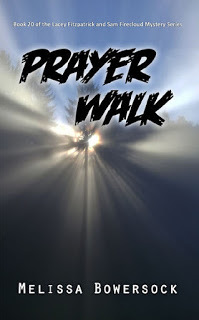 When I started writing the Lacey Fitzpatrick and Sam Firecloud Mystery Series over two and a half years ago, I never for a moment imagined it would grow to what it is today. I had ideas for two, maybe three, books, but no more. Of course, it went far beyond that. I'm pleased (and surprised!) to announce the release of Book 20, Prayer Walk.
When I started writing the Lacey Fitzpatrick and Sam Firecloud Mystery Series over two and a half years ago, I never for a moment imagined it would grow to what it is today. I had ideas for two, maybe three, books, but no more. Of course, it went far beyond that. I'm pleased (and surprised!) to announce the release of Book 20, Prayer Walk. Based in sprawling Los Angeles, medium Sam Firecloud and his partner, Lacey Fitzpatrick, never seem to run out of hauntings to investigate and resolve, but when they get two separate calls from two frantic customers, they realize they’re getting stretched pretty thin. How are they going to handle two cases at once? Daniel, Sam’s fifteen-year-old son, has a solution, but they quickly discover that solution could lead to serious injury—or worse—for the supernaturally talented boy.
One of the best parts of writing a series is seeing how the characters develop, how the relationships evolve, and how these "friends" continue to grow and expand. For those loyal readers who have followed the series, I think you'll be pleased with Daniel's progress in this book.
To celebrate this milestone book, I'm putting ALL ebooks in the series on sale for just 99 cents each. If you haven't already boarded the Sam and Lacey train, or if you've fallen behind on their progress, here's your chance to catch up on every book for just pennies. Get the entire series, and be all set for your summer reading, for less than $20!
The series will be on sale through June 30, 2019.
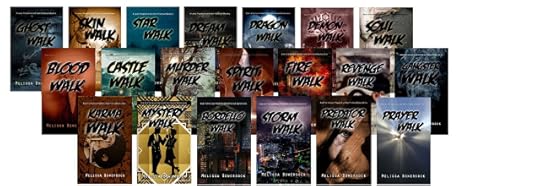
And don't forget that these same fast-paced, paranormal mysteries are also being converted into audio book format. So far we've got Books 1-4 complete, with more to come. Take Sam and Lacey with you on your summer travels, or just keep current during your daily commute time. Sam and Lacey are always the best carpool partners.
To listen to samples of the current books, check out my SoundCloud page here.
Published on June 23, 2019 11:14
June 20, 2019
Listen Up! New Audio Book of Sonnets for Heidi
 Family secrets; every family has 'em. What was the real story about your great uncle who moved to Alaska and was never heard from again? Why doesn't your cousin ever get invited to family get-togethers? Whose picture is that in the shoebox with no name on it?
Family secrets; every family has 'em. What was the real story about your great uncle who moved to Alaska and was never heard from again? Why doesn't your cousin ever get invited to family get-togethers? Whose picture is that in the shoebox with no name on it?Sonnets for Heidi is a book about just such a secret.
Trish Munroe never planned to be a caregiver, but circumstances have conspired to make her responsible for her elderly Aunt Heidi. Trish does her best to balance the demands of her job, her love life and Heidi's advancing Alzheimer's, but the pressure is taking its toll. When Heidi passes away, there's a bittersweet reprieve until Trish uncovers a family secret of forbidden love that takes her on a tragic yet triumphant journey of the heart.
Sonnets for Heidi was a Finalist in the 2016 New Mexico-Arizona Book Awards, and is now available as an audio book as well as a paperback and eBook. You can listen to a sample of the audio book here.
But I have to warn you, read (or listen to) this book with plenty of Kleenex! When I was writing the last few chapters, I had to stop periodically to mop myself up, because I was crying buckets. I think this is the most heartrending yet emotionally satisfying book I have written. If that sounds like your cup of tea, I hope you will check it out. You'll be glad you did.
Published on June 20, 2019 10:19
June 3, 2019
Write Your Story Even if You Can’t Write
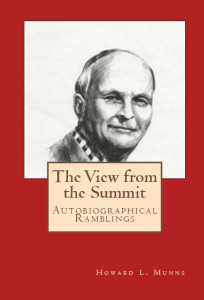 A while back, I was working with a 90-year-old woman on her memoirs. If you just glanced at the small, frail woman, you would never guess what she’s seen, where she’s been or what she’s accomplished in her life. Like most older people, she doesn’t carry a sign saying who she is, and those who don’t look beneath the aging face miss a lot.To add to the complexity, she’s always been dyslexic. Like most differently abled children of her time, she didn’t get any support or sympathy for her difficulty with learning, or even a diagnosis that she could understand. She was labeled “stupid” for a large part of her early life. Because of that, she has a decidedly low confidence in her ability to write.So how did she start working on her memoirs?Not by writing. She kicked off the project by sitting down for interviews with a friend who recorded every word. In this way, she could simply answer the questions put to her, talk easily and simply about the way her life unfolded, and not worry at all about the commas or the way words were spelled. Later, in the editing process, we went back through it and cleaned up the little bits of ramble here, repeating there, and we filled out the episodes with more structure and detail. I have no doubt we crafted a professional and fascinating book of a story well worth the time and trouble.I know not everyone loves to write like I do. I know some people actually dread it. For some, the idea of sitting down and writing their personal story might feel more like sitting down in a dentist’s chair for a root canal. Yet I sincerely doubt these same people would object to pulling up a chair with a friend and just chatting about their lives. How threatening is that?But where to start, you might ask. What questions should the interviewer ask?I have a suggestion for that, as well. I believe almost every household has, somewhere in the dark corners of a closet or tucked away behind the Christmas tablecloth, a shoebox of photos. You know, those loose, grainy black and white photos that never made it into a photo album? They might be photos that seemed inconsequential at the time they were developed, or they could even be hand-me-downs, their context blurred by time. Drag that puppy out of the shadows and start laying photos out on the dining room table. I guarantee you’ll hear more than once, “Oh, I remember that. That was when …”Just remember to have a recorder going when you do this.I think you might be pleasantly surprised by the richness of the recollections. I was lucky. My father wrote his autobiography over the last twenty years of his life. After he died, I scanned in all the typewritten pages, added pictures, and published his story. I had no expectations for selling books or for making money. I just wanted his story out there. It’s the story of our family. It’s the story of America from 1911 to 2002. It’s history. And it’s a rare treasure more valuable than any other.Do you or a family member have stories that get trotted out every Thanksgiving? Stories of childhood antics and family sagas? Stories of love and loss, of friendship, of heartbreak, and adventure? I strongly urge you to capture those tellings before the opportunity is gone. This is one time when I will say, with all confidence and encouragement, you don’t have to be a writer to write. Forget the commas, forget the sentence structure. Trot out that old cassette recorder and start talking, start asking questions. Just start. These stories won’t be available forever.Grab them now. Before they’re gone.Originally published by Indies Unlimited on June 30, 2015.
A while back, I was working with a 90-year-old woman on her memoirs. If you just glanced at the small, frail woman, you would never guess what she’s seen, where she’s been or what she’s accomplished in her life. Like most older people, she doesn’t carry a sign saying who she is, and those who don’t look beneath the aging face miss a lot.To add to the complexity, she’s always been dyslexic. Like most differently abled children of her time, she didn’t get any support or sympathy for her difficulty with learning, or even a diagnosis that she could understand. She was labeled “stupid” for a large part of her early life. Because of that, she has a decidedly low confidence in her ability to write.So how did she start working on her memoirs?Not by writing. She kicked off the project by sitting down for interviews with a friend who recorded every word. In this way, she could simply answer the questions put to her, talk easily and simply about the way her life unfolded, and not worry at all about the commas or the way words were spelled. Later, in the editing process, we went back through it and cleaned up the little bits of ramble here, repeating there, and we filled out the episodes with more structure and detail. I have no doubt we crafted a professional and fascinating book of a story well worth the time and trouble.I know not everyone loves to write like I do. I know some people actually dread it. For some, the idea of sitting down and writing their personal story might feel more like sitting down in a dentist’s chair for a root canal. Yet I sincerely doubt these same people would object to pulling up a chair with a friend and just chatting about their lives. How threatening is that?But where to start, you might ask. What questions should the interviewer ask?I have a suggestion for that, as well. I believe almost every household has, somewhere in the dark corners of a closet or tucked away behind the Christmas tablecloth, a shoebox of photos. You know, those loose, grainy black and white photos that never made it into a photo album? They might be photos that seemed inconsequential at the time they were developed, or they could even be hand-me-downs, their context blurred by time. Drag that puppy out of the shadows and start laying photos out on the dining room table. I guarantee you’ll hear more than once, “Oh, I remember that. That was when …”Just remember to have a recorder going when you do this.I think you might be pleasantly surprised by the richness of the recollections. I was lucky. My father wrote his autobiography over the last twenty years of his life. After he died, I scanned in all the typewritten pages, added pictures, and published his story. I had no expectations for selling books or for making money. I just wanted his story out there. It’s the story of our family. It’s the story of America from 1911 to 2002. It’s history. And it’s a rare treasure more valuable than any other.Do you or a family member have stories that get trotted out every Thanksgiving? Stories of childhood antics and family sagas? Stories of love and loss, of friendship, of heartbreak, and adventure? I strongly urge you to capture those tellings before the opportunity is gone. This is one time when I will say, with all confidence and encouragement, you don’t have to be a writer to write. Forget the commas, forget the sentence structure. Trot out that old cassette recorder and start talking, start asking questions. Just start. These stories won’t be available forever.Grab them now. Before they’re gone.Originally published by Indies Unlimited on June 30, 2015.
Published on June 03, 2019 07:21
May 22, 2019
Memorial Day Special
I think we all love Memorial Day. It signals the start of summer, the start of vacations and fun in the sun. But often we forget the real reason behind the holiday. Who among us does not have one of the Greatest Generation in our families? It's true that World War II is vanishing into the past more and more with every year that passes. But it's also true that the stories lived then, the lives lost then, should never be forgotten. On this Memorial Day, as all others, we honor our warriors, we honor our fallen, we honor those called on to stand tall in the face of oppression.
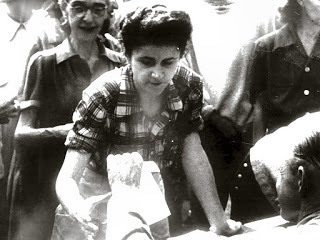 My aunt, Marcia Gates, was one of those. Captured by the Japanese on Corregidor in the Philippines, she became a prisoner-of-war. Interned in a makeshift POW camp, she endured captivity, endured starvation, endured life-threatening medical issues. She endured. I wonder how many of us could do the same?
My aunt, Marcia Gates, was one of those. Captured by the Japanese on Corregidor in the Philippines, she became a prisoner-of-war. Interned in a makeshift POW camp, she endured captivity, endured starvation, endured life-threatening medical issues. She endured. I wonder how many of us could do the same?
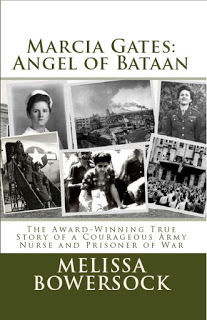 To commemorate Memorial Day and my aunt's own quiet courage, the ebook of her story is on sale for just 99 cents through May 31, 2019.
To commemorate Memorial Day and my aunt's own quiet courage, the ebook of her story is on sale for just 99 cents through May 31, 2019.
In addition, the audio book is also available, and the narration by Adrianne Price gives the story a heartrending poignancy.
The stories of the Greatest Generation must not be forgotten. Their sacrifices must not be forgotten. Please join me in remembering these courageous patriots on this Memorial Day. They fought to keep our country free--and our world.
 My aunt, Marcia Gates, was one of those. Captured by the Japanese on Corregidor in the Philippines, she became a prisoner-of-war. Interned in a makeshift POW camp, she endured captivity, endured starvation, endured life-threatening medical issues. She endured. I wonder how many of us could do the same?
My aunt, Marcia Gates, was one of those. Captured by the Japanese on Corregidor in the Philippines, she became a prisoner-of-war. Interned in a makeshift POW camp, she endured captivity, endured starvation, endured life-threatening medical issues. She endured. I wonder how many of us could do the same?  To commemorate Memorial Day and my aunt's own quiet courage, the ebook of her story is on sale for just 99 cents through May 31, 2019.
To commemorate Memorial Day and my aunt's own quiet courage, the ebook of her story is on sale for just 99 cents through May 31, 2019. In addition, the audio book is also available, and the narration by Adrianne Price gives the story a heartrending poignancy.
The stories of the Greatest Generation must not be forgotten. Their sacrifices must not be forgotten. Please join me in remembering these courageous patriots on this Memorial Day. They fought to keep our country free--and our world.
Published on May 22, 2019 21:12
May 18, 2019
Keeping the BACK in Back Story
 Recently I stumbled across this post for Stephen King’s top 20 rules for writers. I can agree with most of them, and one in particular about research really struck a chord with me for a couple of reasons.18. The research shouldn’t overshadow the story. “Remember that word back. That’s where the research belongs: as far in the background and the back story as you can get it.”Reading this was a cautionary reminder for me. I was writing a novel about an archaeologist, and at the same time I was doing volunteer work with an archaeology group, cataloging artifacts from a dig in 1000-year-old ruins. My experience there was ramping up my authenticity, providing insight into the work of my protagonist and giving me a worthy foundation on which to build my story. It was also firing my imagination and revving my brain in ways I have to curb.Along with my cataloging work in the lab, I had taken classes in ancient industries: cordage-making, weaving, pottery-making. Every day in the lab and every class gave me insight into the workings of an ancient village, and each time I came away with a giddy determination to use what I’ve learned. I loved the fact that I could write authentically about this. The authenticity would bring weight to the book that I could not have imagined.But when I started thinking about how I was going to introduce all this new-found knowledge, the bubble of excitement popped. I began to imagine my protagonist, a college professor/archaeologist, giving pointers to her students as they survey an ancient site. Imparting knowledge. Pop-quizzing. And the feeling rapidly changed from excitement to dull heaviness.The research had completely overshadowed the story.Interestingly enough, I’ve read quite a few techno-thrillers lately that suffer from the same malady. Paragraph after paragraph of the evolution of political factions and regimes, long names teased out of jumbled acronyms, even the design and workings of futuristic guns, aircraft, etc. Some of the books have begun to read more like textbooks than novels. I find it very distracting when the narrative suddenly changes from telling the story to bringing me up to speed on the latest gadget. I understand that books of this nature have a ton of background information and that the reader really does need a rudimentary understanding, but the real trick is working it subtly into the story so it’s not droning from the lectern.Luckily for me, after getting kicked in the head from these two different angles, I could go back to my story and let it unfold organically. The knowledge and information are there in my brain, and if called on, can be worked into the story. IF called on. If not, then it stays in my brain, enriching my life but not taking over my novel. Stephen’s right. Back story belongs in the back. It’s settings, props, but not the main characters. I may have to bookmark this post so I can remind myself often.Originally published by Indies Unlimited on April 14, 2015.
Recently I stumbled across this post for Stephen King’s top 20 rules for writers. I can agree with most of them, and one in particular about research really struck a chord with me for a couple of reasons.18. The research shouldn’t overshadow the story. “Remember that word back. That’s where the research belongs: as far in the background and the back story as you can get it.”Reading this was a cautionary reminder for me. I was writing a novel about an archaeologist, and at the same time I was doing volunteer work with an archaeology group, cataloging artifacts from a dig in 1000-year-old ruins. My experience there was ramping up my authenticity, providing insight into the work of my protagonist and giving me a worthy foundation on which to build my story. It was also firing my imagination and revving my brain in ways I have to curb.Along with my cataloging work in the lab, I had taken classes in ancient industries: cordage-making, weaving, pottery-making. Every day in the lab and every class gave me insight into the workings of an ancient village, and each time I came away with a giddy determination to use what I’ve learned. I loved the fact that I could write authentically about this. The authenticity would bring weight to the book that I could not have imagined.But when I started thinking about how I was going to introduce all this new-found knowledge, the bubble of excitement popped. I began to imagine my protagonist, a college professor/archaeologist, giving pointers to her students as they survey an ancient site. Imparting knowledge. Pop-quizzing. And the feeling rapidly changed from excitement to dull heaviness.The research had completely overshadowed the story.Interestingly enough, I’ve read quite a few techno-thrillers lately that suffer from the same malady. Paragraph after paragraph of the evolution of political factions and regimes, long names teased out of jumbled acronyms, even the design and workings of futuristic guns, aircraft, etc. Some of the books have begun to read more like textbooks than novels. I find it very distracting when the narrative suddenly changes from telling the story to bringing me up to speed on the latest gadget. I understand that books of this nature have a ton of background information and that the reader really does need a rudimentary understanding, but the real trick is working it subtly into the story so it’s not droning from the lectern.Luckily for me, after getting kicked in the head from these two different angles, I could go back to my story and let it unfold organically. The knowledge and information are there in my brain, and if called on, can be worked into the story. IF called on. If not, then it stays in my brain, enriching my life but not taking over my novel. Stephen’s right. Back story belongs in the back. It’s settings, props, but not the main characters. I may have to bookmark this post so I can remind myself often.Originally published by Indies Unlimited on April 14, 2015.
Published on May 18, 2019 14:49
May 6, 2019
New Release: Predator Walk
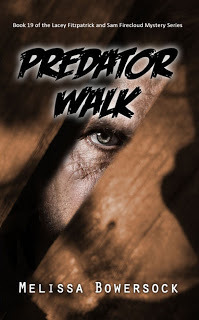 Where have Sam and Lacey been? If you've been asking that question, I have the answer. They've been busy with a new and very surprising case. Here's the deal:
Where have Sam and Lacey been? If you've been asking that question, I have the answer. They've been busy with a new and very surprising case. Here's the deal:When medium Sam Firecloud and his partner, paranormal investigator Lacey Fitzpatrick, are called in on a new case, it appears to be a normal haunting, if there is such a thing. But neither is prepared for the effect this ghost has on Lacey, nor the ripple effect through their own relationship. Suddenly it’s not just sending a lost spirit on its way that concerns them, but Lacey’s own mental and emotional health, and—perhaps—the future of their partnership.
I'm happy to announce Book 19 of the popular series, Predator Walk, a story that becomes alarmingly personal for both Lacey and Sam. To celebrate the launch, Predator Walk is only 99 cents through May 12, 2019 (just in time for Mother's Day?).

Not yet familiar with Lacey and Sam? Ghost Walk, Book 1 of the series, is always just 99 cents. And don't forget that Ghost Walk, Skin Walk, Star Walk and Dream Walk are all available as audio books, as well.
Published on May 06, 2019 07:22
April 22, 2019
Plot-Driven vs. Character-Driven Stories
I would guess that most readers don’t really want to analyze the stories they read; they just want to sink into them and enjoy them. I don’t know anyone who deliberately chooses a book based on whether it’s a plot-based story or a character-based story. So what’s the difference and why does it matter? A plot-driven story is, generally speaking, about an ordinary person in an extraordinary situation. H. G. Wells’ War of the Worlds is a plot-based story. It’s about a very average Englishman who suddenly finds himself in the unfathomable situation of dodging Martians bent on human destruction. The man is forced to make his way across a war-torn land, struggling to avoid the Martians, help others if he can, and find a way to survive. The man himself could be any man or everyman. In this kind of story, the exterior action affects and drives the interior struggle of the character, his emotions and decisions.A character-driven story is quite different. It’s more about an extraordinary person who may live in very ordinary conditions. The conflict in a character-based story is almost always internal, yet it drives the exterior action. Robert Louis Stevenson’s Dr. Jekyll and Mr. Hyde is a character-based story about a very unusual man (or men) whose very nature sets the stage for conflict. Dr. Jekyll must deal with his own emotions at the same time as he is dealing with the consequences of Mr. Hyde’s actions.In a recent discussion of a plot-driven book with a friend, I mentioned the emotional character arc (or lack thereof) and my friend asked, “Isn’t that only in a character-driven book?” Well, yes and no.Although each type of story relies largely on a certain kind of action — exterior action in a plot-based story and interior action in a character-based story — both types contain at least the possibility of the two separate layers of story arcs. What I find lacking in so many plot-based books is the arc of the protagonist’s emotional growth, particularly in series. I’ve recently read a few books in an action/adventure series, and while I’ve enjoyed the stories, I’ve realized that they have very little soul to them. They remind me of a season of hour-long TV dramas where the main character starts out at the top of the hour, searches out or is drawn into a mystery, intrigue or conflict, solves the conflict (but not without setbacks and surprises) and finishes the hour emotionally as the same character he was when it started, ready to begin the next installment. While the main character may learn things along the way about his adversary, a secret group, maybe little-known history, he does not, usually, learn much new about himself. The whole point of the show is to bring the character full circle so he can reset and start at ground zero for the next episode.Granted, someone who is looking for the latest James Bond novel (by whomever) and not finding it is probably not going to default to Louisa May Alcott or Jane Austen. Okay, I get that. But there’s no rule that says a plot-based action/adventure can’t have some emotional growth along the way. I tend to think that the more layers a story has, the more interesting it is. What do you think? Am I asking too much? Is it enough just to have a roller coaster ride? Or do you like your characters with a dash of insight, as well?Originally published by Indies Unlimited on March 3, 2015.
A plot-driven story is, generally speaking, about an ordinary person in an extraordinary situation. H. G. Wells’ War of the Worlds is a plot-based story. It’s about a very average Englishman who suddenly finds himself in the unfathomable situation of dodging Martians bent on human destruction. The man is forced to make his way across a war-torn land, struggling to avoid the Martians, help others if he can, and find a way to survive. The man himself could be any man or everyman. In this kind of story, the exterior action affects and drives the interior struggle of the character, his emotions and decisions.A character-driven story is quite different. It’s more about an extraordinary person who may live in very ordinary conditions. The conflict in a character-based story is almost always internal, yet it drives the exterior action. Robert Louis Stevenson’s Dr. Jekyll and Mr. Hyde is a character-based story about a very unusual man (or men) whose very nature sets the stage for conflict. Dr. Jekyll must deal with his own emotions at the same time as he is dealing with the consequences of Mr. Hyde’s actions.In a recent discussion of a plot-driven book with a friend, I mentioned the emotional character arc (or lack thereof) and my friend asked, “Isn’t that only in a character-driven book?” Well, yes and no.Although each type of story relies largely on a certain kind of action — exterior action in a plot-based story and interior action in a character-based story — both types contain at least the possibility of the two separate layers of story arcs. What I find lacking in so many plot-based books is the arc of the protagonist’s emotional growth, particularly in series. I’ve recently read a few books in an action/adventure series, and while I’ve enjoyed the stories, I’ve realized that they have very little soul to them. They remind me of a season of hour-long TV dramas where the main character starts out at the top of the hour, searches out or is drawn into a mystery, intrigue or conflict, solves the conflict (but not without setbacks and surprises) and finishes the hour emotionally as the same character he was when it started, ready to begin the next installment. While the main character may learn things along the way about his adversary, a secret group, maybe little-known history, he does not, usually, learn much new about himself. The whole point of the show is to bring the character full circle so he can reset and start at ground zero for the next episode.Granted, someone who is looking for the latest James Bond novel (by whomever) and not finding it is probably not going to default to Louisa May Alcott or Jane Austen. Okay, I get that. But there’s no rule that says a plot-based action/adventure can’t have some emotional growth along the way. I tend to think that the more layers a story has, the more interesting it is. What do you think? Am I asking too much? Is it enough just to have a roller coaster ride? Or do you like your characters with a dash of insight, as well?Originally published by Indies Unlimited on March 3, 2015.
 A plot-driven story is, generally speaking, about an ordinary person in an extraordinary situation. H. G. Wells’ War of the Worlds is a plot-based story. It’s about a very average Englishman who suddenly finds himself in the unfathomable situation of dodging Martians bent on human destruction. The man is forced to make his way across a war-torn land, struggling to avoid the Martians, help others if he can, and find a way to survive. The man himself could be any man or everyman. In this kind of story, the exterior action affects and drives the interior struggle of the character, his emotions and decisions.A character-driven story is quite different. It’s more about an extraordinary person who may live in very ordinary conditions. The conflict in a character-based story is almost always internal, yet it drives the exterior action. Robert Louis Stevenson’s Dr. Jekyll and Mr. Hyde is a character-based story about a very unusual man (or men) whose very nature sets the stage for conflict. Dr. Jekyll must deal with his own emotions at the same time as he is dealing with the consequences of Mr. Hyde’s actions.In a recent discussion of a plot-driven book with a friend, I mentioned the emotional character arc (or lack thereof) and my friend asked, “Isn’t that only in a character-driven book?” Well, yes and no.Although each type of story relies largely on a certain kind of action — exterior action in a plot-based story and interior action in a character-based story — both types contain at least the possibility of the two separate layers of story arcs. What I find lacking in so many plot-based books is the arc of the protagonist’s emotional growth, particularly in series. I’ve recently read a few books in an action/adventure series, and while I’ve enjoyed the stories, I’ve realized that they have very little soul to them. They remind me of a season of hour-long TV dramas where the main character starts out at the top of the hour, searches out or is drawn into a mystery, intrigue or conflict, solves the conflict (but not without setbacks and surprises) and finishes the hour emotionally as the same character he was when it started, ready to begin the next installment. While the main character may learn things along the way about his adversary, a secret group, maybe little-known history, he does not, usually, learn much new about himself. The whole point of the show is to bring the character full circle so he can reset and start at ground zero for the next episode.Granted, someone who is looking for the latest James Bond novel (by whomever) and not finding it is probably not going to default to Louisa May Alcott or Jane Austen. Okay, I get that. But there’s no rule that says a plot-based action/adventure can’t have some emotional growth along the way. I tend to think that the more layers a story has, the more interesting it is. What do you think? Am I asking too much? Is it enough just to have a roller coaster ride? Or do you like your characters with a dash of insight, as well?Originally published by Indies Unlimited on March 3, 2015.
A plot-driven story is, generally speaking, about an ordinary person in an extraordinary situation. H. G. Wells’ War of the Worlds is a plot-based story. It’s about a very average Englishman who suddenly finds himself in the unfathomable situation of dodging Martians bent on human destruction. The man is forced to make his way across a war-torn land, struggling to avoid the Martians, help others if he can, and find a way to survive. The man himself could be any man or everyman. In this kind of story, the exterior action affects and drives the interior struggle of the character, his emotions and decisions.A character-driven story is quite different. It’s more about an extraordinary person who may live in very ordinary conditions. The conflict in a character-based story is almost always internal, yet it drives the exterior action. Robert Louis Stevenson’s Dr. Jekyll and Mr. Hyde is a character-based story about a very unusual man (or men) whose very nature sets the stage for conflict. Dr. Jekyll must deal with his own emotions at the same time as he is dealing with the consequences of Mr. Hyde’s actions.In a recent discussion of a plot-driven book with a friend, I mentioned the emotional character arc (or lack thereof) and my friend asked, “Isn’t that only in a character-driven book?” Well, yes and no.Although each type of story relies largely on a certain kind of action — exterior action in a plot-based story and interior action in a character-based story — both types contain at least the possibility of the two separate layers of story arcs. What I find lacking in so many plot-based books is the arc of the protagonist’s emotional growth, particularly in series. I’ve recently read a few books in an action/adventure series, and while I’ve enjoyed the stories, I’ve realized that they have very little soul to them. They remind me of a season of hour-long TV dramas where the main character starts out at the top of the hour, searches out or is drawn into a mystery, intrigue or conflict, solves the conflict (but not without setbacks and surprises) and finishes the hour emotionally as the same character he was when it started, ready to begin the next installment. While the main character may learn things along the way about his adversary, a secret group, maybe little-known history, he does not, usually, learn much new about himself. The whole point of the show is to bring the character full circle so he can reset and start at ground zero for the next episode.Granted, someone who is looking for the latest James Bond novel (by whomever) and not finding it is probably not going to default to Louisa May Alcott or Jane Austen. Okay, I get that. But there’s no rule that says a plot-based action/adventure can’t have some emotional growth along the way. I tend to think that the more layers a story has, the more interesting it is. What do you think? Am I asking too much? Is it enough just to have a roller coaster ride? Or do you like your characters with a dash of insight, as well?Originally published by Indies Unlimited on March 3, 2015.
Published on April 22, 2019 10:11
April 8, 2019
Now Available: Audio Book of Burning Through
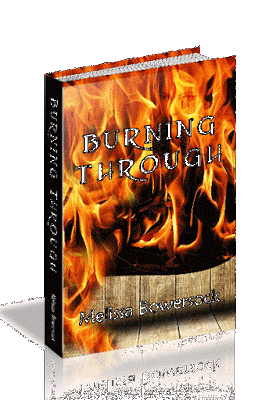 Do you love a good ghost story? Me, too. My book Burning Through came to me in a strange way; strange, except for us writers. Another author friend told me briefly that she was writing a ghost story, except her story had two ghosts, one good and one evil. I thought that was an interesting premise. And, as happens so often with writers, I began to think, "If I were to write something like that, how would I do it?" That was all it took.
Do you love a good ghost story? Me, too. My book Burning Through came to me in a strange way; strange, except for us writers. Another author friend told me briefly that she was writing a ghost story, except her story had two ghosts, one good and one evil. I thought that was an interesting premise. And, as happens so often with writers, I began to think, "If I were to write something like that, how would I do it?" That was all it took. This book flowed so well, so easily, that I wrote it in something like 32 days. I just remember being almost consumed by it. In the mornings I would type up what I had plotted out the night before, and every evening I would explore where the next chapter would go. It all came together seamlessly, and when I finished the book, I knew it needed only a few editing touch-ups before publishing. Here's the blurb:
When Jennifer and Robert Stinson buy a beautifully restored Victorian house, the last thing they expect is to share their home with a ghost ― especially one with a penchant for setting fires. Unfortunately the ghostly arson only creates more tension in their already strained marriage. Jen launches her own investigation into the history of her house and discovers a surprising ally in a sympathetic fire captain. But can she unravel the mystery of the fires before they consume her home, her marriage … and her life?
So what do you do with a page-turner like that? Well, turn it into an audio book, of course! I'm happy to announce that Burning Through is now an audio book, narrated by Susan Iannucci, and available through Amazon, Audible, or iTunes. If you'd like to listen to a sample of it, you can do that here on my SoundCloud page. And if you want to find out how it all turns out, you'll have to read--or listen to--the rest of it.
Published on April 08, 2019 01:00

